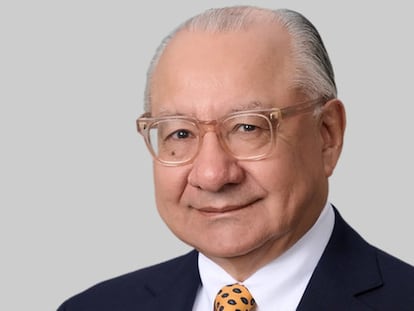Ex-US ambassador who put Evo Morales on the map arrested for spying for Cuba
Manuel Rocha is known for waging a fear campaign against the former Bolivian president that ended up swaying voters to the then-union leader

The 2002 Bolivian elections attracted a level of attention that is unlikely to be seen again in the country. The presidential election was won by the neoliberal candidate, Gonzalo Sánchez de Lozada, who narrowly beat his competitors, including a young union leader named Evo Morales. Sánchez de Lozada — who had previously held office between 1993 and 1997 — had the support of the U.S. political consulting company Greenberg Carville Shrum and then-U.S. ambassador to Bolivia, Manuel Rocha, who tried to sway voters.
The story behind the 2002 election was examined in the U.S. documentary Our Brand Is Crisis, which was later turned into an eponymous feature film, starring Sandra Bullock, with George Clooney as producer.
Now, the story has taken an unexpected turn: on Monday, the U.S. Federal Bureau of Investigation (FBI) detained Rocha in Miami for allegedly acting as a secret agent for Cuba. According to the Associated Press, the former ambassador is accused of “working to promote the Cuban government’s interests.” Rocha, 73, was the U.S. ambassador to Bolivia between 2000 and 2003. At the time of his arrest, he was working as an advisor to an international lobbying and communications company.
At the 2002 elections, Bolivia was deciding between continuing with the neoliberal model represented by Sánchez de Lozada or opting for moderate change in Manfred Reyes Villa, the then-mayor of Cochabamba, who was the clear favorite to win. Between them stood Evo Morales, who was rising in the polls with his calls for radical change. Back then, Morales — who would go on to win the 2006 election and hold office for 13 years — was a union leader of coca planters who led protests and roadblocks.
Shortly before the vote, Rocha told the press that if the Bolivian electorate “vote for those who want Bolivia to return to exporting cocaine, that will seriously jeopardize any future aid to Bolivia from the United States.” The statement was considered a direct attempt to sustain U.S. influence in the region, but it had the opposite effect. More voters turned towards Morales, who came in second place and thwarted Reyes Villa’s victory. A post-election survey found that 14% of those who voted for Morales in 2002 did so in rejection of Rocha’s statement. Sánchez de Lozada won the presidency with 22.4%, Morales came in second place with 20.94%, and Reyes Villa came third with 20.91%.

The ambassador’s comment fueled numerous conspiracy theories. It was believed that the United States wanted to boost Sánchez de Lozada, who was considered a stronger defender of U.S. interests, even though Reyes Villa also had a good relationship with Washington. In this context, Sánchez de Lozada — the “patriarch of neoliberalism” — was elected president of Bolivia for a second time. But his government was engulfed in crisis, and he resigned two years later. Since then, Morales has often joked that Rocha was his “campaign manager.” During his three terms as president, Morales had a tense relationship with the United States, a country with which, until now, Bolivia had no ambassadorial relations.
Rocha’s arrest as an alleged Cuban agent has revived the conspiracy theories about the 2002 election in Bolivia. Some believe that Rocha’s statement at the time was in fact intended to win support for Morales, who was considered “Cuba’s candidate.” In other words, they think that Rocha was indeed acting as Morales’ “campaign manager.” Others argue that his arrest validates Sánchez de Lozada’s theory that he was pushed out of office by a conspiracy of foreign powers. “Goni Sánchez de Lozada was right all along: they were not social movements, nor the people or anything like that, they were organized groups that managed to overthrow him seeking the subjugation of Bolivia to foreign interests,” economist Gabriel Espinoza, an opposition spokesperson, posted on X.
As far as is known, Rocha’s arrest is not due to alleged crimes committed in the past, but rather to his current work as a lobbyist. U.S. media that have covered the story report that authorities are cracking down on lobbying in favor of other countries, when these are not declared in advance to the authorities.
Manuel Rocha was born in Colombia, but grew up in the United States, where, despite his humble origins, he went on to have a brilliant diplomatic career. Before serving as a diplomat in Bolivia, he was the U.S. ambassador to Argentina between 1997 and 2000. Previously, he worked in the U.S. Interests Section in Cuba. After 25 years in diplomacy, he left the State Department and joined the private sector.
Sign up for our weekly newsletter to get more English-language news coverage from EL PAÍS USA Edition
Tu suscripción se está usando en otro dispositivo
¿Quieres añadir otro usuario a tu suscripción?
Si continúas leyendo en este dispositivo, no se podrá leer en el otro.
FlechaTu suscripción se está usando en otro dispositivo y solo puedes acceder a EL PAÍS desde un dispositivo a la vez.
Si quieres compartir tu cuenta, cambia tu suscripción a la modalidad Premium, así podrás añadir otro usuario. Cada uno accederá con su propia cuenta de email, lo que os permitirá personalizar vuestra experiencia en EL PAÍS.
¿Tienes una suscripción de empresa? Accede aquí para contratar más cuentas.
En el caso de no saber quién está usando tu cuenta, te recomendamos cambiar tu contraseña aquí.
Si decides continuar compartiendo tu cuenta, este mensaje se mostrará en tu dispositivo y en el de la otra persona que está usando tu cuenta de forma indefinida, afectando a tu experiencia de lectura. Puedes consultar aquí los términos y condiciones de la suscripción digital.








































